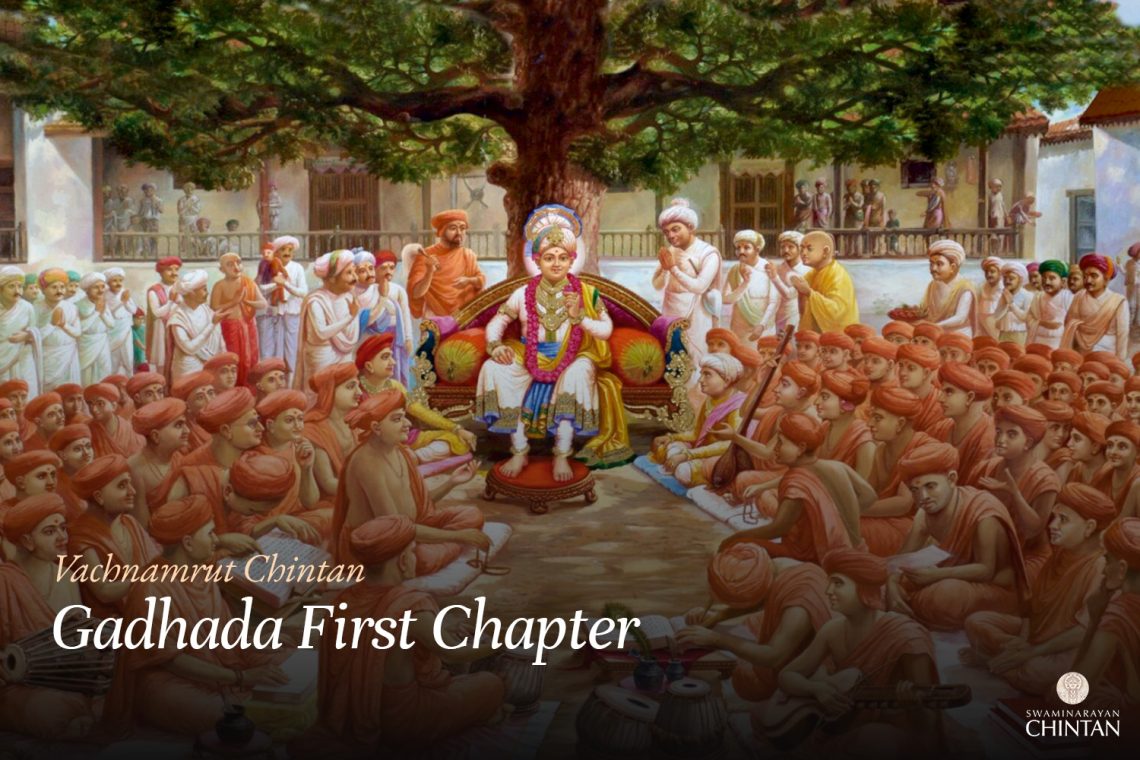Central Insights:
- Key factor behind removing vāsanās (worldly desires) and the means to do this.
Key Points:
- One who avoids vāsanās is a true ekāntik (single-minded) devotee.
- By examining one’s desires related to both God and the world and gradually reducing worldly desires, one can remove vāsanās.
- Keep association with a person who is free from desires.
Explanation
This Vachanamrut focuses on the importance of avoiding vāsanās (desires). Shriji Maharaj starts with a gracious statement, emphasizing that avoiding vāsanās is a major means to spiritual growth. Living a life free from desires is the hallmark of an ekāntik devotee. Even if a person achieves a high state of meditation or controls their breath, lingering desires can pull them back from spiritual progress. Thus, the true ekāntik devotee is the one who avoids worldly desires.
How can one avoid vāsanās? Maharaj explains that the first step is to assess the thirst one has for the five senses—shabda (sound), sparsha (touch), rūpa (form), rasa (taste), and gandha (smell). One should introspect whether their desire for worldly pleasures equals or exceeds their desire for God.
People in general do not have a measure of their level of attachment or even consider thinking about it. As inner cravings arise, we tend to fulfill them or strive to do so, often carried away by the flow of these desires. We lack a plan or the courage to resist them, and instead, we become slaves to our impulses.
Shreeji Māharāj says that people have a lot of intellect, but they still do not know who they are. Including determining how much desire they have. People can discern another person’s weaknesses but not their own. Those who want to have avoided their desires should be able to diagnose their craving. When a person is sick, a doctor will firstly examine the patient, then he will come up with a schedule and provide advice on the appropriate course of action. The definition of examination is this, to measure what stage a person is at, how old it is, how strong it is, how it started, etc. Only then can you determine a course of action to eliminate it.
Vāsanā is akin to a spiritual disease. Maharaj states that if one’s ear is as eager to hear worldly matters as it is to hear about God, then it is evident that both desires are equal. One should regularly test this balance. The same applies to the other senses—sparsha, rūpa, rasa, and gandha. One should examine whether their effort for bodily pleasures equals their effort for Maharaj. By reducing worldly desires and increasing desires related to God, one attains equanimity in the face of good and bad sensory inputs.
Maharaj emphasizes the need for patience, as quick results are not possible. He suggests starting with ātmanishthā (self-realization), reducing worldly desires gradually, and increasing spiritual desires. This leads to a strong devotion where all cravings are eradicated.
Vach.G.A. 34, offers the same solution again. Maharaj explains similar methods to eliminate desires. When Muktanand Swami asked, “What is the method to avoid vāsanā (desires)?” Maharaj replied, “Firstly, through ātmanishthā (self-realization), recognizing the insignificance of the five sensory pleasures (panchvishay), and understanding the greatness of Maharaj, these three means can completely eradicate desires. Eventually, one feels that they never had any desires, realizing that their former state was an illusion, and they have always been free from desires.”
In this Vachanamrut, Maharaj first emphasizes the method of continuously examining and gradually reducing one’s desires, while increasing one’s spiritual desires for God. This gradual reduction and increase are the primary methods. Ātmanishthā and similar practices act as internal supportive factors. The main method highlighted by Maharaj is practical efforts because these are immediately actionable. Ātmanishthā and other practices take time to develop. Maharaj indicated that the degree of ātmanishthā or detachment can vary; everyone can make efforts according to their capacity. Hence, the primary focus is on the practical method, while other supportive methods enhance the effort and expedite the results, but the core method remains the same.
Maharaj explains that avoiding vāsanā is a significant and challenging practice, essential to the ekāntik path. It can only be achieved by those who are truly free of desires (nirvāsanik). It cannot be fully attained by merely reading scriptures or hearing about it. True guidance comes from those who have walked this path and mastered it. Such realized individuals can provide the necessary guidance and establish others firmly on this path, while simply reading or hearing about it from others is insufficient.
Glossary
| Atmanishtha – Steadfastness in the realization of the soul |
| Ekantik – Single-minded devotee A devotee imbued with Dharma, Gyan, Vairagya, and Bhakti, fully dedicated to God. |
| Gandha – Smell |
| Nirvasanik – One who has no worldly desires A person who is truly free from internal cravings for sensory pleasures, not just externally renounced; the ideal state for spiritual advancement. |
| Panchvishay – Five sensory pleasures The objects of the five senses: sound, touch, form, taste, and smell, which cause attachment and delusion. |
| Rasa – Taste |
| Rupa – Form |
| Satsang – Association with true saints & devotees. |
| Shabda – Sound |
| Sparsha – Touch, one of the five sensory pleasures. |
| Vasana – Worldly desires |

